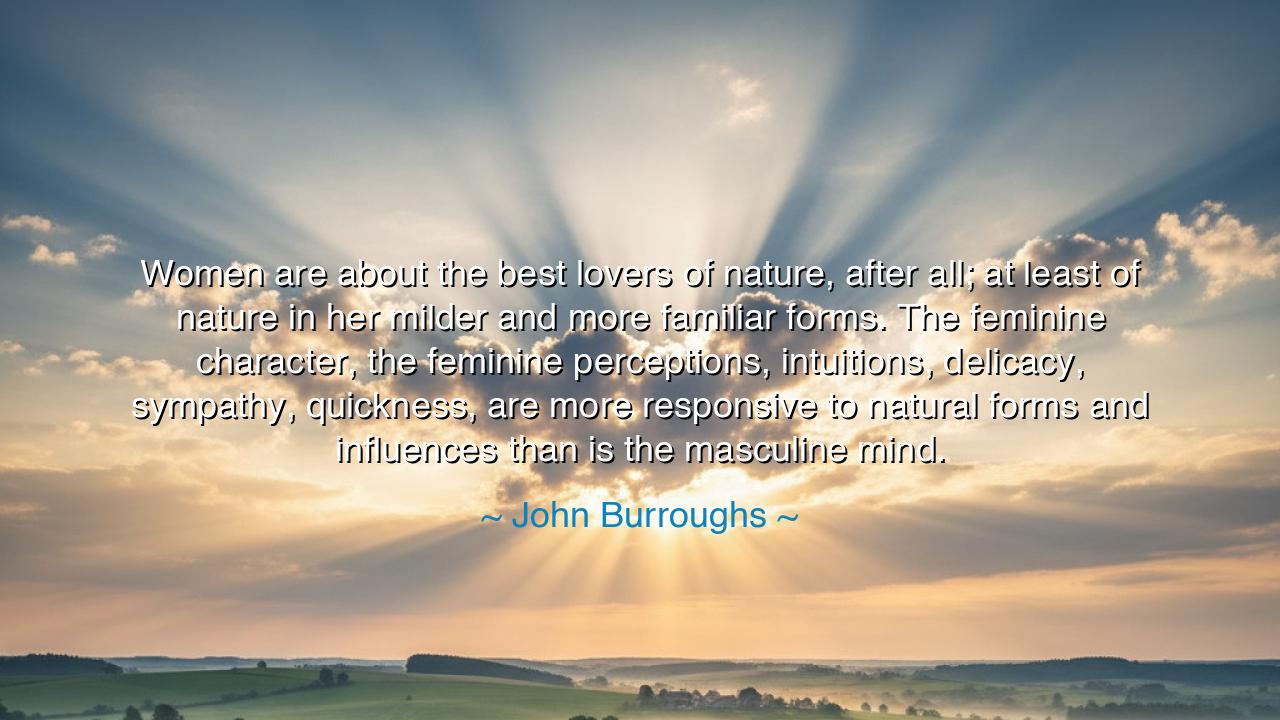
Women are about the best lovers of nature, after all; at least
Women are about the best lovers of nature, after all; at least of nature in her milder and more familiar forms. The feminine character, the feminine perceptions, intuitions, delicacy, sympathy, quickness, are more responsive to natural forms and influences than is the masculine mind.






Listen well, O children of the future, to the words of John Burroughs, who speaks of the deep connection between women and the natural world: "Women are about the best lovers of nature, after all; at least of nature in her milder and more familiar forms. The feminine character, the feminine perceptions, intuitions, delicacy, sympathy, and quickness, are more responsive to natural forms and influences than is the masculine mind." In these words, Burroughs reveals a profound truth about the unique relationship that women share with the earth. It is in their delicate sensitivity, their ability to perceive the smallest changes in the natural world, that women find an unparalleled connection to the beauty and wisdom of nature.
In the ancient world, O children, the great philosophers and sages recognized the special bond between women and the earth. Artemis, the Greek goddess of the hunt and wilderness, was not only the protector of animals but the embodiment of the feminine connection to the natural world. She represented the gentleness and intuitive wisdom that women bring to the care and preservation of life. In contrast to the masculine ideals of conquest and dominion, Artemis' power lay in her nurturing connection to nature, in her ability to understand its rhythms and cycles, to listen to its subtle whispers, and to protect it with compassion. In this, she symbolizes the qualities that Burroughs speaks of—the delicacy, sympathy, and quickness that allow women to attune themselves to the natural world with a depth that transcends logic.
Consider, O children, the example of Rachel Carson, the great environmentalist who brought the hidden dangers of pesticides to the world’s attention with her book Silent Spring. Carson’s intuition, her ability to sense the balance of life and the destruction wrought upon it, was a product of her deep connection to nature—a connection that was not born of forceful intellect but of delicate perception and a profound sympathy for the earth and all its creatures. Through her words, she became the modern embodiment of Burroughs’ insight into the feminine spirit’s affinity for nature—not to conquer it, but to understand it, to protect it, and to ensure its continuity for future generations.
Burroughs speaks not just of a connection to nature, but of a particular sensitivity that women possess. This sensitivity—a combination of intuition, perception, and compassion—enables women to attune themselves to the subtle movements of the world around them. In this way, they see and feel things that may elude the masculine mind, which often seeks to dominate and control rather than understand and nurture. The feminine approach to the natural world is one of collaboration, not conquest. It is an approach grounded in listening, in feeling, and in the belief that every creature and plant has its own sacred purpose in the grand web of life.
Consider, O children, the story of Jane Goodall, whose study of chimpanzees in the forests of Africa has forever changed the way we understand our relationship with animals and the natural world. Goodall’s intuitive empathy, her ability to understand the emotional lives of the chimpanzees, reflects the feminine capacity for nurturing and connection. She did not study them through the lens of cold, detached science but with a heart attuned to their needs, their behaviors, and their emotions. Goodall’s work exemplifies the quickness and delicacy of feminine perception, qualities that allowed her to forge a bond with her subjects and make ground-breaking discoveries that continue to shape the field of primatology.
In all of this, O children, we see that women's relationship to the natural world is one of profound unity and reverence. It is through the feminine character that the world is seen not as something to be exploited but as something to be honored, protected, and nurtured. Sympathy for the earth and its creatures is not an intellectual pursuit, but a deeply emotional and intuitive one—an understanding that transcends the barriers of thought and touches the heart. The feminine spirit does not seek to dominate but to live in harmony with the natural world, recognizing that all life is interconnected and interdependent.
The lesson, O children, is that the feminine connection to nature is a source of wisdom and strength. The qualities of intuition, quickness, and sympathy that Burroughs speaks of are not to be seen as weaknesses but as profound strengths—strengths that allow women to perceive the world in ways that others might miss. The world requires not just intellect and power but compassion, delicacy, and the ability to listen to the earth’s whispers. Women have a special place in this, not as rulers, but as protectors, nurturers, and guardians of the natural world.
Let this wisdom guide you, O children: embrace the feminine qualities of connection, empathy, and sympathy that bind you to the world around you. Whether you are a woman or a man, cultivate these gifts within yourself and learn to see the world not as something to be controlled, but as something to be understood and respected. Just as women have often been the lovers of nature, so too can we all learn from their example, approaching the world with a spirit of care, respect, and compassion. In this way, you will forge a future where humanity and nature walk hand in hand, in perfect harmony.






AAdministratorAdministrator
Welcome, honored guests. Please leave a comment, we will respond soon